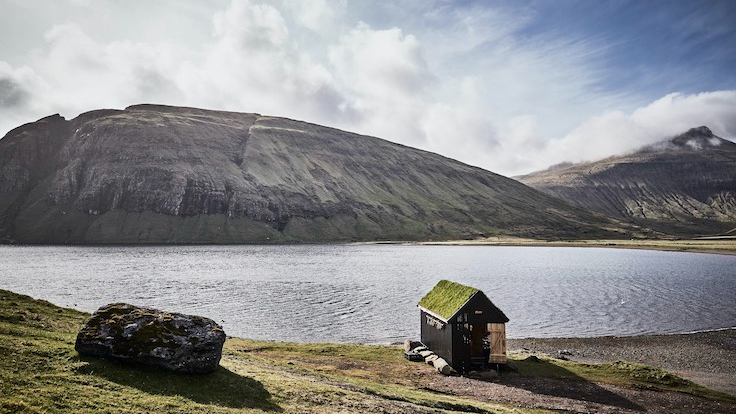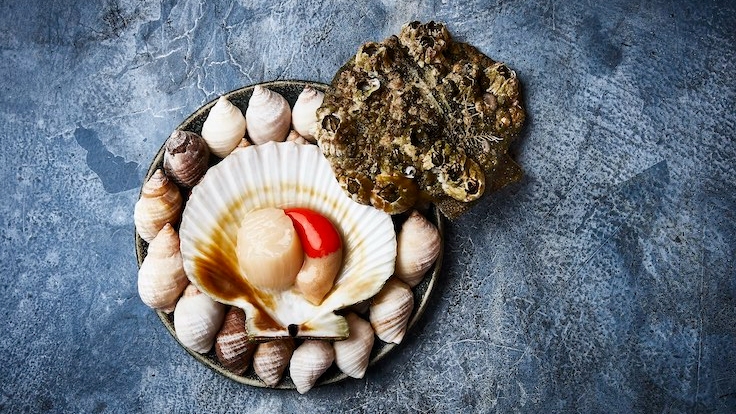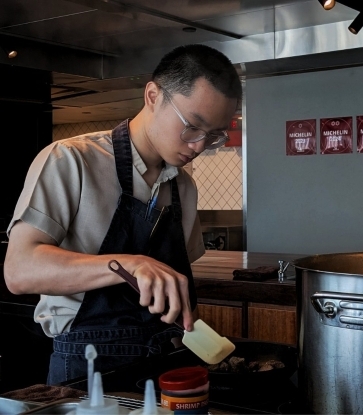In between Norway and Iceland, sitting in the shadow of the Leynavatn mountains in the Faroe Islands, is a former energy-efficient farmhouse that is also said to be the world’s most remote dining destination: KOKS.
Awarded 2 MICHELIN Stars with its chef, Poul Andrias Ziska, having received the MICHELIN Young Chef Award - Nordic Countries 2019 when he was only 29 years old, KOKS will be coming to Singapore for the first time ever to do a four-week residency at the Grand Hyatt Hotel Singapore from 23 January to 18 February 2022.
Having trained in the kitchens of 3 Star Geranium in Denmark and 2 Star Mugaritz in Spain, Ziska is determined to represent the unique identity of the Faroe Islands through his cuisine that he describes as both ancient yet modern and earthy yet refined.

“The World’s Most Remote Restaurant” in Easily Accessible Singapore
“Being the world’s most remote dining destination, 90% of our guests come from overseas,” says Ziska. “I would say that guests who have dined at KOKS actively and intentionally booked a table with the knowledge of what we do at the restaurant, especially with our location in the Faroe Islands.”
The Faroe Islands is a very small, remote archipelago comprising 18 islands that are located at the North Atlantic Ocean. A quick online search reveals that the distance between the Faroe Islands and Singapore is around 10,934 kilometres, with a travel time of roughly 24 hours.
“We opened KOKS in the Faroe Islands because the team and myself were all born and raised there. The restaurant was created with the intention of showcasing Faroese ingredients and raw materials to the world,” explains Ziska. “Throughout the centuries, our country has sourced and utilised everything around the island, shaping the cuisine in the process."

At KOKS, Ziska categorises his cuisine as “New Nordic”. And while he says it is difficult to define its meaning, he and his team follow a set of philosophies and principles when it comes to new Nordic cuisine, with minimalism being one of its core components.
“Inspiration, for me, comes from everywhere: from my dining experiences at restaurants and homes, to social media, memories, and experimenting," he says. At KOKS, the tasting menu comprises 18 to 21 courses that showcase the flavours of the ocean, with contrasting plates that are usually made with fermented meats. “This is quintessentially Faroese,” says Ziska. “80% of the menu is from the sea, which is where our cooking strengths as a culinary team lie. Fermentation is a huge part of our identity, so we make sure to communicate that as well. We stay true to Faroese cuisine and try to be as local as possible.”
What is Faroese Cuisine?
In the Faroe Islands, techniques such as fermentation and dry-aging are widely used for the local fare. When asked about the must-try local dishes for visitors curious for a taste of Faroese cuisine, Ziska says: “Visit some locals and get them to cook for you. Must-tries are fermented lamb and fish. There are a lot of interesting birds as well, but apart from the fresh fish and seafood, definitely lamb in format you can get — fermented, dried, or fresh.”

Ziska explains that a lot of lamb roam freely around the Faroe Islands and that there are more sheep and lamb than people. “Fish, lamb, seabirds, puffins, and whales are the main sources of our food. Because of our location, fermentation is big in the Faroe Islands; hence, we ferment meat and contrast this with the pure and clean flavours of the fresh seafood we get. Since our raw materials are of superior quality due to our clean climate, cold weather, and proximity to the ocean, we ferment spontaneously by simply hanging the meat, often in winter, and without adding any other ingredients.”
“I believe it is very important to preserve the knowledge of sourcing and making food the traditional way.”
“As a result of this natural fermentation process, the meat starts to break down naturally. This is a food tradition of ours that has been created out of necessity. This is our way of eating: catching and preserving animals due to the remoteness of our land,” Ziska says.

What to Expect from the KOKS Pop-up in Singapore
“For the Singapore pop-up, we have created a menu where some of the dishes come from our restaurant in the Faroe Islands; so yes, we are bringing ingredients and produce from there. We will also serve dishes that we know we can easily replicate with ingredients available in Singapore,” says Ziska.
An important dish that KOKS is bringing to Singapore is one that contains fermented lamb and fishes such as ocean perch, which is fermented for about six weeks. Ziska says this is a dish that guests who have been to KOKS in the Faroe Islands will be familiar with, as it is strongly tied to the Faroese identity. He describes it as “an experience”.
“Personally, I like to touch, see, and smell the ingredients instead of sourcing online. The strength of our dishes come from how they are made.”
“At home in the Faroe Islands, we boil fish whole, and then serve it with potatoes and fermented lamb intestines, which are minced and melted. They lend very strong flavours. And at KOKS, the version we do is to make a potato purée by grating potato with the fermented lamb intestines. We also serve small potatoes and a little bit of grated fish alongside a cheese sauce,” he explains.
Ziska continues: “A salad we intend to replicate in Singapore contains halibut, radish, and different seasonal herbs, tossed in a watercress sauce. We plan to improvise a version of this dish once we get to Singapore and physically explore what ingredients we can use. We are confident we will find what we want.”

Another dish that guests can spot in the KOKS menu in Singapore is made with crispy cod bladder, a course that Ziska is personally proud of. “Using and utilising every part of the fish with no waste is a creative thing to do — to cook every single part of the fish and make it tasty as we are increasing value to something that is not usually valued at all. A Faroese tradition is that we believe in using the whole animal in different ways. How much of the cod can we preserve, serve, or use? This was the question I asked myself. Crispy Cod Bladder may sound like an unusual dish to many, but it is quite natural to us Faroese. As again, with such a remote place, it is natural to utilise everything, and we don’t throw anything away,” he explains.

“We also have a langoustine roll (pictured on the right) that requires a long and complicated process, but once it gets to the table, diners are greeted with a fairly simple presentation. What matters to us is that we are able to successfully put out the best flavours of the langoustine in its purest form,” he says.
Poul Andrias Ziska’s First Taste of Singapore
"We have done a few pop-ups recently, from Australia to Greenland, and it’s always interesting to see different places and experience different cultures. There’s always something to pick up when you travel that can be brought back to the restaurant. Singapore is a very interesting place because I have never been there before, and it’s really far away from home," Ziska says.
Ziska shares that he is excited to explore the city, meet people, and taste the food that the Lion City has to offer. “I am bringing my family also, so hopefully, we will have a little bit of time to see Singapore even though I imagine there will be a lot of work,” he says. “I have only booked one restaurant so far, which is Zén, so I am most definitely looking forward to that. I also hope to try some street food and dine at a few high-end restaurants.”

What’s Next for KOKS?
KOKS opened in 2011, and despite having been awarded 2 MICHELIN Stars and the MICHELIN Young Chef Award - Nordic Countries 2019, Ziska keeps his feet on the ground. “We gradually grew as a team and became increasingly aware of our impact in the restaurant industry. We have an idea of what the ultimate dining experience, for us, is, and right now, we are nowhere near our fullest potential — we are just getting started,” he says.
“I believe we have many good, interesting years to come where we can improve and to be the best we can be. I want to continue evolving and doing what we love, which is cooking and to do our best in it. Obviously, the MICHELIN Stars set an example of high quality food and cooking. Being awarded means that we are doing something right — and we are especially proud of this," Ziska says.
"Being an almost-primitive restaurant in an old house, situated in a small village, and serving dishes with no tablecloth, being able to achieve what we have while still keeping our identity and working with what we truly believe in is very honourable. I'd like to give a big shoutout to the MICHELIN Guide and express my gratitude to have restaurants like ours being rewarded. I know it’s not common for such a young chef to be awarded 2 MICHELIN Stars, but I still believe that regardless of age, I would still be extremely proud of the achievement. To be honest, I would be equally proud if I were 50 and received the stars," laughs Ziska.
“Ultimately, for me, my mission is to have a full restaurant of happy guests and staff. That would be the most rewarding at the end of the day.”
Given the chance to choose the next pop-up destination, Ziska says that Japan is on his wish list. "This is the place I want to visit at the very least, and doing a pop-up in Japan would be a great way to experience the country. I believe there are a lot of similarities between Japan and from where I am from. I always want our food at KOKS to taste the best way it was intended, and the Japanese seem to be experts at this," he says.
"I want guests who are dining in KOKS to experience the Faroe Islands as much as possible. Obviously, this would be different in Singapore, so once traveling freely is possible again, our wish is that the guests in the Singapore pop-up would want to visit the Faroe Islands someday," hopes Ziska. "We want guests to remember this experience, and we promise to make it as memorable as possible."
All images courtesy of Claes Bech-Poulsen.
Led by executive chef Poul Andrias Ziska, the core team of chefs and front-of-house staff of KOKS will be in Singapore for their first full-length Asian residency at the Grand Hyatt Singapore, putting their personal touch on every single service from 23 January to 18 February 2022. Book your table here.

















